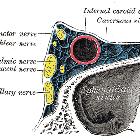Colliculus-facialis-Syndrom
Facial colliculus syndrome refers to a constellation of neurological signs due to a lesion at the facial colliculus, involving:
- abducens nerve (CN VI) nucleus
- facial nerve (CN VII) fibers at the genu
- medial longitudinal fasciculus
Clinical presentation
- lower motor neuron facial nerve palsy proximal to geniculate ganglion hence including loss of sensation of the taste in anterior two-thirds of the tongue and hyperacusis
- diplopia
- horizontal conjugate gaze palsy (including internuclear ophthalmoplegia)
Note that all symptoms are not invariably present in every patient.
Pathology
Etiology
Causes of facial colliculus syndrome vary by age:
- younger patients
- tumor
- demyelination (e.g. multiple sclerosis)
- viral infection (e.g. rhombencephalitis)
- older patients
- vascular (e.g. stroke)
The facial palsy is due to interruption of the ipsilateral facial nerve fibers at the genu as they arch behind the abducens nerve (CN VI) nucleus (thus forming the colliculus).
The conjugate gaze palsy is due to involvement of innervation not only to the ipsilateral abducens nerve to lateral rectus but also to the interneurons projecting into the medial longitudinal fasciculus which contribute innervation of the contralateral medial rectus (thus internuclear ophthalmoplegia). However, this is not always the case.
Radiographic findings
Usually only detected on MRI as a small focus of high signal in facial colliculus at the floor of 4th ventricle on DWI or T2/FLAIR sequences.
See also
Siehe auch:
und weiter:

 Assoziationen und Differentialdiagnosen zu Colliculus-facialis-Syndrom:
Assoziationen und Differentialdiagnosen zu Colliculus-facialis-Syndrom:

